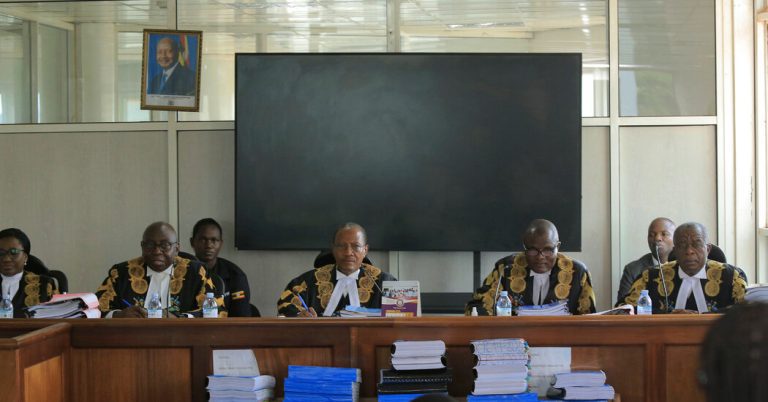Uganda’s Constitutional Court has largely upheld an anti-gay law signed by President Yoweri Museveni last year, undermining efforts by activists and rights groups to overturn legislation that has drawn global condemnation and strained the east African nation’s relationship with the West. .
The legislation, signed by Mr Museveni in May, calls for life imprisonment for anyone involved in same-sex sex. Anyone who tries to have same-sex relationships can face up to a decade in prison.
Uganda faced international fallout for passing the law, with the World Bank suspending all new funding and the United States imposing sanctions and visa restrictions on top Ugandan officials. But the law was popular in Uganda, a country of more than 48 million people where religious and political leaders often protest against homosexuality.
The implications for Uganda will be closely watched in other African countries where anti-gay sentiment is on the rise and anti-gay legislation is being considered, such as Kenya, Namibia, Tanzania and South Sudan. In February, Ghana’s parliament passed an anti-gay law, but the country’s president said he would not sign it until the Supreme Court ruled on its constitutionality.
In Uganda, the five-judge bench said the law violated several basic rights granted in the country’s Constitution, including the right to health and privacy. But in their 200-page decision, they largely rejected the request to strike down the law.
“We refuse to strike down the Anti-Homosexuality Act 2023 in its entirety and neither will we grant a permanent injunction against its enforcement,” Richard Buteera, one of the judges, said as he read a summary of the decision to a packed courtroom.
Frank Mugisha, a prominent gay rights activist and one of the petitioners, said they would appeal the Constitutional Court decision to the Supreme Court.
“I am very sad,” Mr. Mugisha said in a telephone interview. “The judges have been swayed by propaganda from the anti-gay movement who have consistently said this is in the public interest and contradicted all the arguments we made about the Constitution and international obligations.”
Ugandan law stipulates the death penalty for anyone convicted of “aggravated homosexuality”, a sweeping term defined as acts of same-sex relations with minors or persons with disabilities, those carried out under threat or while someone is unconscious. Even being charged with what the law calls “attempted aggravated homosexuality” carries a prison sentence of up to 14 years.
The passage of the law – which also imposes stiff fines on organizations convicted of promoting homosexuality – alarmed human rights advocates, who said it would give new impetus to the introduction of equivalent draconian laws in other African nations. Uganda is among African countries already outlawing gay sex, but the new law creates additional offenses and provides far greater criminal penalties.
The United Nations, along with local and international human rights groups, said the law contradicted Uganda’s Constitution and would likely be used to harass and intimidate its LGBTQ population.
The ratification of the anti-homosexuality law, as the law is officially known, renewed control of the government of Mr Museveni, who has ruled Uganda with tight control for nearly four decades. Mr Museveni, his son — whom he recently appointed army chief — and other top members of his government have been accused of detaining, beating, torturing and disappearing critics and opposition members.
The law was first introduced in March last year by a lawmaker who said homosexuality was becoming pervasive and threatening the sanctity of the Ugandan family. Some lawmakers also claimed that constituents had tipped them off about alleged plans to promote and recruit students to homosexuality – accusations that human rights groups said were false.
Anti-gay sentiment is widespread among Muslim and Christian lawmakers and religious leaders of both faiths. They say homosexuality is a western import and held rallies to show support for the law before it was passed.
A few weeks after it was introduced in the House, the law was quickly passed with only two lawmakers opposed.
Activists, academics and human rights lawyers who challenged the law in court said it violated not only the Ugandan Constitution, which guarantees freedom from discrimination, but also international treaties, including the African Charter on Human Rights and the Rights of People. They also argued that Parliament passed the law too quickly, without enough time for public input — arguments the rulings rejected in their decision.
Human rights groups said that since the law was introduced and passed, LGBTQ Ugandans have faced intense violence and harassment.
Conventing for Equality, a coalition of human rights groups in Uganda, has documented hundreds of violations and abuses of rights, including arrests and forced anal exams. Gay and transgender Ugandans have also been kicked out of their homes and beaten by family members — forcing many to flee to neighboring countries such as Kenya. In early January, Steve Kabuye, a prominent gay rights campaigner, was stabbed in an attack that activists said was motivated by homophobia linked to the law. Mr. Kabuye has since fled to Canada with the help of a non-governmental organization.
The passing of the law had direct effects in Uganda as well. Health experts also worried that the law would hinder access to medicine for gay men, especially those seeking HIV testing, prevention and treatment.
The United States has said it will restrict visas for current and former Ugandan officials believed to be responsible for implementing the anti-gay policy. The Biden administration also issued a business advisory for Uganda and removed the country from a special program that allows African products duty-free access to the United States.
The World Bank, citing the anti-gay law, also said in August it would freeze all future funding to Uganda. Economic pressures continued to pile up, with foreign travelers and investors staying away from Uganda.
Ahead of the decision, Mr Museveni remained publicly defiant, but analysts and diplomats said he was privately worried about his country being labeled a pariah and the devastating economic impact it was causing.




